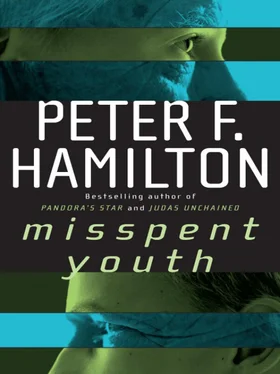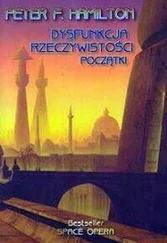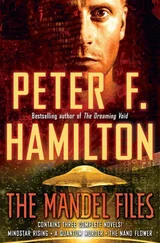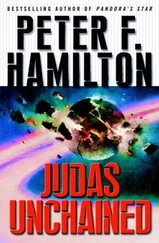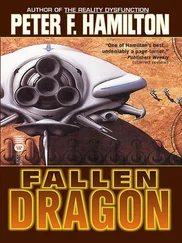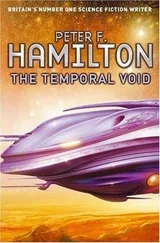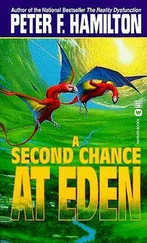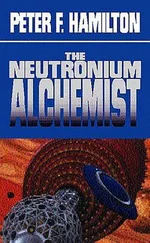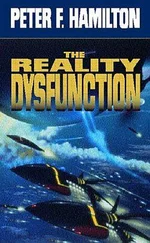At the west end of the dock, the police had kept the Connaught Bridge open to officially sanctioned traffic. As they drove over, it was clear to Jeff that the police were only just managing to hold the protestors off the road. He wondered if they were all wearing Rob Lacey masks again, but he was too far away to see clearly. Somehow he doubted it; stones, bottles, and chunks of wood were being thrown over the police lines to litter the tarmac on the slip roads at the big raised traffic circle. The chanting and taunts carried a strong current of menace. There was nothing good natured about this crowd, they were committed and serious.
The Euro Socio-Industrial summit was intended to provide a forum between academics and corporate researchers and the legislators. As with most government-organized summits the intention was a noble one. With so much new technology emerging so rapidly, especially in cybernetics and semiorganics, the effect and upheaval on people’s lives was becoming progressively larger. If, however, the Brussels Parliament and the European commissioners knew what was going to be released into the market, they could predict the effect it might have on employment and social patterns. That way, once trends could be anticipated, then legislation could be drawn up to smooth the introduction. Of course, the reverse was also true: Desirable trends could possibly be induced by new innovations and developments, of which a high-temperature superconductor was the prime example. Legislative and financial incentives could therefore be formulated to encourage and facilitate such desirable advancement. Every scientific discipline was involved and invited, from microbiological waste processing to optronic computing, genoprotein therapy to reusable packaging.
To a broad spectrum of Europe’s political activists, and even some of the smaller mainstream political parties, it was a monstrous technocrat attempt at social engineering. Who decided what was a desirable trait and trend? Where was the slightest hint of democratic input? Where, every Separatist movement demanded to know, was consideration for national integrity and sovereign culture?
The summit had managed to attract a phenomenal amount of antagonism over the preceding months. The coalition of protest groups formed to counter it talked of mobilizing a Million Citizen Voices to have their say. By the time the delegates were arriving to register, police put the numbers massing outside the center at close to twenty thousand. Thousands more were assembling at every mainline railway station across London with the intention of marching on the Marshall Centre. They’d arrived from right across Europe, most of them earnest but peaceable.
It was Europol’s Internal Security division that had overall responsibility for maintaining public order at official pan-European events. And as the anti-federal movement became more vocal over the years, so the commissioners had responded by giving Europol an extraordinarily wide common-security brief to observe and interdict the Separatist terrorists. The last six months had seen Europol’s electronic intelligence division monitoring encrypted data traffic between the coalition’s more extreme elements. It had issued warnings to the Internal Security Commissioner’s Bureau and the English Home Office concerning the strong possibility of riots and civil disturbances being orchestrated by known radicals and Separatists. The officials took it under advisement.
As with any major event, the protest had snowballed far beyond the original concept of its instigators. When the first groups started to announce their intention to picket the venue, and an equally strident Commission declared it would not be intimidated by such noninclusive, violence-oriented parties, the media had quickly realized this was going to be one of the biggest civil demonstrations in years. Naturally, the publicity helped attract even more people.
It was a strange atmosphere crackling through the Marshall Centre when Jeff registered at the main desk and collected his bulging summit information pack. People were scurrying about with a slightly defiant air, greeting friends and colleagues a little too effusively. The determination to carry on as normal in the face of adversity was reminiscent of a wartime mentality. It wasn’t far from the truth. The huge arboretum/reception area faced the Albert Dock. Delegates could look out directly at their adversaries milling around the sealed-off university campus buildings and see the laser-lit banners shining at them—most formatted with obscene slogans and caricatures. Hundreds of national flags were being waved; Jeff hadn’t seen so many Union Jacks clustered together since the last Last Night of the Proms the year the BBC went bankrupt. Nothing was audible—the thick glass shielded those inside from the sound; but despite that the collective voice of hatred directed toward them could still be sensed. The officials from Brussels were wearily familiar with the odium directed toward them, and managed to ignore it, while the science complement was altogether more jittery.
Jeff kept a strong hold on Annabelle, who had been uncharacteristically quiet since they got off the train. “Let’s go find our hotel room,” he said once he was clutching his pack.
They had to take several consecutive pedwalks along the central concourse before they reached the foot of the octagonal tower, which housed the hotel. Their room was on the thirty-third floor, facing northwest, which gave them a superb view out over the city. Annabelle pressed herself to the window, looking down on the Albert Dock and the protestors on the other side. “There’s so many of them,” she said mournfully.
Jeff came over to stand cautiously behind her; he’d never been particularly comfortable with heights. The long drop down to the muddy water below seemed to be weakening his calf muscles. When he looked over her shoulder he could see the protestors had also taken over Beckton Park behind the university campus. Its grass had been churned away by several thousand campers.
“Couldn’t we just go home?” Annabelle asked. “There’s going to be a riot, I know there will. It’ll be like the Bonn Finance summit again. Lots of people are going to get hurt.”
“If we give in and go home, then that means they’ve won. We’ll be quite safe in the Centre. Those police boys down there know what they’re doing; they’ve had a lot of experience dealing with crowds like this.”
“I thought you didn’t approve of the European Parliament and the Commission.”
“Of course I don’t. It’s a bureaucratic nightmare that needs total reform, or abolishing altogether. The protestors are quite right, it’s completely antidemocratic. But that doesn’t give them the right to intimidate people into adopting their agenda.”
Annabelle gave the protestors a sad moue. “This is the only way people have left to object today. The Commission doesn’t allow any democratic opposition. We’ll never be given a referendum to ask us if we want to withdraw from the Union.”
“Are you a Separatist?” he asked in surprise.
“Isn’t everyone?”
“I don’t know. Are they?”
“Everyone at school is. Europe is so oppressive. We haven’t got any of the freedoms your generation had.”
“Oh.” Jeff had always viewed the Separatist movement with very ambivalent feelings. For anyone like him who’d grown up in the seventies and eighties, when the IRA mainland bombing campaign was at its worst, Separatist methods had too many resonances to make him entirely comfortable with their goals. Besides, he considered their views simplistic. National economies and industries had become heavily integrated; any kind of political and financial breakup would trigger continentwide problems. But then, what cost freedom?
Читать дальше
